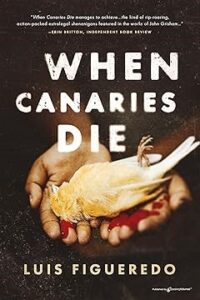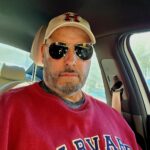Thriller author Luis Figueredo chats with me today about his new medical legal novel, When Canaries Die.

Bio:
Luis Figueredo was born and raised in the Bronx, New York. He completed his undergraduate degree in History from Brandeis University in Massachusetts and earned his law degree from Harvard Law School.
During his legal profession, Luis developed a nationwide practice representing a diverse group of clients that include municipalities, national trade associations, corporations, real estate developers, and Indian Tribes.
Welcome, Luis. Please tell us about your current release.
When Canaries Die is the third book involving a Miami attorney, Pierce Evangelista. Pierce finds himself navigating a world on the brink of collapse as a deadly pandemic sweeps the globe. Amidst the chaos, Pierce is tasked with challenging the U.S. government’s immigration policies that left thousands of asylum-seekers stranded in dire conditions. As the virus spreads uncontrollably and the demand for blood transfusions skyrockets, criminal organizations exploit the situation, turning human blood into a precious commodity. With the border towns to Tijuana, Juarez, and Matamoros descending into chaos, Pierce must confront powerful forces and fight to reopen the border to save lives. Dive into this gripping legal thriller infused with science fiction and suspense, where the line between survival and exploitation blurs in a world plagued by tragedy and greed.
What inspired you to write this book?
I wanted the book When Canaries Die to be more than just a story; I wanted it to be a catalyst for reflection and conversation. My goal was to encourage readers to examine their views on immigration and inspire them to advocate for a more compassionate and understanding approach to U.S. immigration policies.
Ultimately, I wrote the book to raise awareness about the border crisis and promote empathy in how we approach the challenges faced by asylum seekers.
This story reflects my sincere concern for humanity and the painful connections between the fictional narrative and the harsh realities of border issues. I hope that readers will engage with the characters on a personal level and feel empathy for those enduring the hardships of migration and crisis.
Excerpt from When Canaries Die:
Matamoros Camp- on the U.S.-Mexico border
Maggie Malone, an attorney in the Houston office of the American Civil Liberties Union, was assigned to pick up Pierce and Moses in Brownsville and take them to the Matamoros Camp. She eased the Ford Explorer through the clogged checkpoint at the U.S.-Mexico border.
“That’s the camp just up ahead,” she said, pointing to the thousands of makeshift shelters made up of tarps and trash bags clustered at the edge of the Rio Grande River. Each tent, on average, was home to four or five people. The camp was massive, tarpaulins stretching out as far as the eye could see.
Mo wrinkled his nose at the sour, musky smell that permeated the SUV as they drew closer, while Pierce listened to the hum of the wipers as they worked to clear the droplets of rain from the windshield. The large numbers of people milling around with forlorn faces and broken eyes rivaled those of the raindrops.
What exciting project are you working on next?
I recently helped the Apache Tribe open the Apache Lonestar Casino in Oklahoma. Duringthat process, I learned about casino operations. I am writing a story about a black hat hacker who reverse engineers the software in particular slot machines and starts robbing casinos.
When did you first consider yourself a writer?
My daughter Jordan, decided to self-publish my first manuscript DIME as a Christmas gift. When I saw my manuscript in print that inspired me to write my second book. I guess that was when I considered myself a writer.
Do you write full-time? If so, what’s your workday like? If not, what do you do other than write and how do you find time to write?
No, I do not write full time. I work as an attorney.
What would you say is your interesting writing quirk?
Before I start writing I have a morning ritual where I drink coffee while my Newfoundland Sully eats her Dentastix. Once she starts snoring, it’s time to write.

As a child, what did you want to be when you grew up?
Growing up, I wanted to be a professional basketball player, but I was realistic about my chances and made sure I had a good back up plan. Law school was my fall back.
Anything additional you want to share with the readers?
I appreciate and carefully read the reviews I receive for my books. Reviews allow me to connect with my readers. I like reading about what you enjoyed about the story. Critical reviews are also important because they help me improve my craft. It is an honor that you have taken the time to read about my book. Hopefully, you will decide to read When Canaries Die. Thank you.
